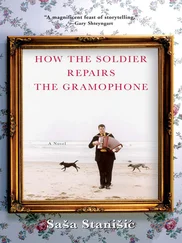Showing up on Citizen Belanger’s doorstep to ask for a job two days ago had seemed like a sound plan. So how had she ended up here, sneaking through his front door, about to become a criminal?
And all so she could do Alphonse’s bidding. She’d hated Henri’s illegal activities, but once she stepped inside Jean Paul’s house, how was she any different than Henri?
Because she was trying to save her family? That answer felt hollow. A wisp of truth cloaked in a lie. She was breaking into a person’s house because she feared her father-in-law, and that fear was pushing her into the dark world she’d despised for so long. Wasn’t there some verse in the Bible about such things? Not the one about her sin finding her out that her governess had been so fond of, but another. One that the priest used to quote at mass. Something about...about...about...
Reaping what you sowed. Yes, that was it. From Galatians chapter 6. “Be not deceived; God is not mocked: for whatsoever a man soweth, that shall he also reap. For he that soweth to his flesh shall of the flesh reap corruption; but he that soweth to the Spirit shall of the Spirit reap life everlasting.”
She grimaced at the door in front of her. Well, she certainly wouldn’t reap life everlasting by sneaking about. But she needed information.
She tucked her perpetually errant strand of hair back up under her mobcap and gave a final look about the yard.
Empty. Not so much as a bird overhead to watch her.
Though the wagon was gone from the stable, she knocked and waited one moment, then another, to be certain no one tarried within.
Everything lay still and quiet.
She slowly lifted the latch and let herself inside, heading straight toward the shelves lining the far wall. But she stopped when her gaze fell to his table. It was beautiful, a masterpiece fit only for a king or some royal relative. She’d been too far away to notice the details earlier that morn, but cornucopias had been carefully carved along the edge of the table, the generous cones overflowing with grapes and squash and apples. The fruit spilled down the side of the table, etched onto the legs with what must have been painfully accurate carving skills.
When Citizen Belanger had left Abbeville before the Révolution, he’d supposedly gone to Paris to make furniture. Perhaps there was a grain of truth in the tale, after all. Citizen Belanger must have made the table and matching chairs himself, for a farmer could hardly afford to purchase something so exquisite.
She trailed a finger over a cornucopia carved on the top of a chair, then forced her gaze away from the furniture and toward the shelves beside the hearth. She had an entire house to search and hadn’t time to tarry, regardless of how beautiful the furniture.
* * *
“You’re late.”
Jean Paul barely glanced at the gendarme as he pulled his wagon to a stop in front of the gendarmerie post. He hopped down and scanned the yard for Captain Monfort, but the gendarme glowering from beneath his black bicorn hat was the only one out of doors.
“I’ve been waiting for over a quarter hour.”
“My previous stop took longer than I planned.” As had the talk with his mysterious bread maker that morn. He hefted a crate of lettuce and carried it toward the entrance to the kitchen. “My apologies.”
Gravel crunched behind him, then came the gendarme’s morose voice. “A contract to supply the gendarmerie with food is hardly a trivial matter. I daresay if you continue to be late, we’ll have to look elsewhere for our food.”
Jean Paul rolled his eyes. Who was this whelp of a soldier? If the man wanted to be intimidating, he needed to stand straighter and give a hard gaze rather than shift away from one. But either way, his dourness had naught to do with Jean Paul’s late arrival. The man had helped unload deliveries for the past three weeks and had been ill tempered each time.
Jean Paul nudged open the door to the empty kitchen and set his crate down with a thud before heading back to the wagon. “I’ll try to be more punctual next week.”
He set the flour and remaining crates of vegetables by the side of the road and hopped back atop his wagon. If the gendarme was going to be so friendly, he could carry the rest of the food back to the kitchen himself.
“Where are you going?” the other man barked.
Jean Paul took up Sylvie’s reigns as the gendarme hastened toward him. “Away. You have your food. Two sacks of flour, four crates of produce. ’Tis settled.”
And he had little tolerance for ill-mannered men in uniform.
“’Tis hardly settled. You’ve more turnips left, and raspberries.” The gendarme stalked to the back of the wagon and reached in for the final crate of berries.
Jean Paul jumped down, clamping his hand about the other man’s arm. “You’ve raspberries aplenty. What remains is for Widow Arnaud.”
“You hardly gave us enough raspberries to keep the gendarmerie two days, let alone a week,” the other man sputtered, his cheeks dark with red.
“’Twill have to suffice. My contract is for four crates of produce. I decide what that produce entails.”
“The widow won’t know they were coming, and thus won’t miss them.”
Jean Paul crossed his arms over his chest and glared. “The widow has three boys and a daughter who delight in berries. Furthermore, she’s a widow because her husband died in the Batavian campaign. I should think a soldier like yourself would be respectful of such sacrifice.”
“Are you implying I’ve a lack of respect?” The gendarme moved his hand to the hilt of his sword.
Jean Paul drew in a small breath. He must tread carefully. ’Twas a reason he sold food to the gendarmerie. Doing so kept him in their good graces, and they therefore asked no questions about his staying in Abbeville—though with his shoulder injury mostly recovered, he could manage as a soldier in one of the military campaigns. They also didn’t question why he’d suddenly returned to Abbeville a year ago, nor did they wonder where he’d gotten the money to purchase the land surrounding his farm.
They simply bought his food.
True, his contacts in Paris could quash any resistance the gendarmerie post gave him, but he’d rather not go that route. Too many townsfolk would raise their brows if Paris got involved.
Yet he wasn’t about to let widows starve while the waists of the gendarmes expanded, either. One person, one gift, one act of generosity when Corinne was ill, and she might be alive today. “The raspberries go to the Widow Arnaud, and if that’s a problem, I can start taking my raspberries to market instead of here. I’ll get a better price than you give me.”
The gendarme curled his lips until his teeth showed, but his mouth held nothing of a smile. “You wouldn’t dare.”
“’Tis my food until you put money in my hand. I can sell it wherever I wish.”
“We might visit your farm in the night and raid your food stores.”
“Try it, and see how long Abbeville retains a gendarmerie post.”
A murderous look flitted across the soldier’s face.
“Does your captain know the threats you make?” Jean Paul growled.
The man just glared.
“Perhaps you should make yourself scarce next week when I deliver the foodstuffs, or I might find an urge to speak with your superior.”
“Jean Paul!” a voice bellowed. “I didn’t know you were here.”
He recognized the speaker before he turned.
Mayor Narcise waddled down the steps of the post, a smile wreathing his flabby face. “I’ve been meaning to talk to you, my boy.”
“Bonjour, Jean Paul.” Captain Monfort followed the mayor down the steps, his eyes surveying the near-empty wagon. “Our chef was saying to me earlier this week how much he appreciates your deliveries. Did he tell you such?”
Читать дальше












